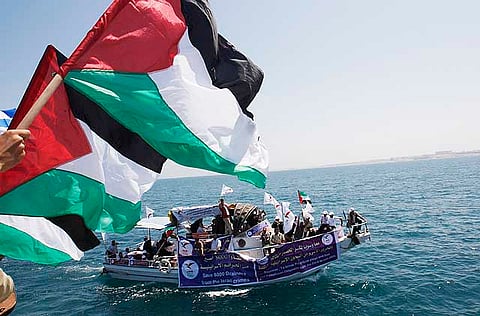Flotilla Intifada is sinking Tel Aviv
The Israeli government's reaction to the aid convoys is a public relations disaster that is sullying the leadership's image at home and abroad

Pro-Hamas Arab media are describing what is happening off the shores of Gaza as a "Freedom Flotilla Intifada" aimed at breaking the Israeli siege, in place since 2007.
It all started with the famous convoy of ships that was attacked in international waters, 62 kilometres off Gaza, in May, which led to the deaths of nine Turkish citizens and brought already strained Turkish-Israeli relations to rock bottom.
Six more ships are now heading from Turkey to Gaza this month, some carrying family members of the nine Turks killed aboard the Mavi Marmara in May. Two of the ships have been prepared by Lebanese NGOs — Naji Al Ali (named after the famous Palestinian cartoonist) and Miriam, which will carry 50 women from across the world to Gaza, including American nuns. There is also Al Amal, a Libyan-sponsored ship that although organised by the Gaddafi International Charity and Development Foundation, will not be allowed to dock in Gaza. Israel insists that the ship will instead be directed to the Egyptian port of Al Arish. The ship, on a mission that the organisers say "is neither provocative nor hostile", sailed from Greece on Saturday, carrying 2,000 tonnes of humanitarian aid and at least nine passengers from Libya, Morocco, Nigeria and Algeria.
Foreign Minister Avigdor Lieberman has reacted defiantly: "I say very clearly, no ship will arrive in Gaza. We will not permit our sovereignty to be harmed". For his part, Israeli Prime Minister Benjamin Netanyahu spoke to Larry King while on an official visit to the US last week, very unapologetically saying: "We regret the loss of life, but we don't apologise for our soldiers defending themselves."
Feeding the fire
Israel continues to claim that allowing flotillas to reach Gaza would have "very serious consequences" for Israeli security. Construction materials badly needed to repair damaged infrastructure in Gaza remain off limits to the Palestinians, since Israel claims that cement and metal could be used for military purposes by Hamas. The Israelis still seemingly fail to realise that the more they prevent these ships from reaching Gaza, the more determined the international community — and especially independent groups — will be to break the siege on Gaza.
Last month, Iran's Red Crescent had wanted to send a ship, called ‘Children of Gaza', to the occupied Strip but decided to delay the trip because it was not allowed to use the Suez Canal. Rather than admit defeat, the Iranians are now considering sending the ship via the Caspian Sea, or airlifting the humanitarian aid to Gaza.
Ordinary Arabs are strongly supportive of the Freedom Flotilla Intifada, while Arab governments have been typically silent. While this is now to be expected, what is surprising is the reaction of the international community, spearheaded by Turkey. The Turks have withdrawn their ambassador, called off joint military drills with the Israeli army, demanded an apology, compensation, and an international inquiry into the flotilla affair. They are now considering applying economic pressure too, saying that Ankara is no longer interested in extending the Russian Blue Stream pipeline, a major trans-Black Sea pipeline that carries natural gas from Russia to Turkey, via Israel.
Stifling debate
The aftershocks of the Flotilla Intifada are still reverberating through Israel itself. There has been an academic backlash over the government's decision to criminalise a group of Israeli professors who openly support the lifting of the Gaza siege. Over 500 Israeli academics (including two former education ministers) have condemned the siege, along with the raid on the Freedom Flotilla, leading the government to push for a Bill in the Knesset that would outlaw boycotts and penalise their supporters, and those who initiate, encourage and provide support for such action against the Israeli government. Foreigners involved in any such activity, the Bill says, will be banned from entering Israel for 10 years. Former Israeli soldier Neve Gordon, now an author, was quoted as saying, "I am worried about what is happening to the space for debate in Israel. I find that there is a proto-fascist mindset developing".
Musicians such as Elvis Costello and the band the Pixies have cancelled shows in Israel, while Hollywood actors such as Dustin Hoffman and Meg Ryan have snubbed an international film festival in Israel, not wanting to associate themselves with Tel Aviv after the flotilla incident. Prince Albert of Monaco, who was due to attend the festival this July, also declined to attend, despite the fact that a special tribute had been prepared for his legendary mother, Grace Kelly.
If such tributes cannot win support for Israel, then it is clear that the country's government has to consider alternative strategies such as lifting the siege on Gaza. Tel Aviv's reaction to the Flotilla Intifada has been a public relations nightmare, damaging its image in the international community and within, like never before. With leaders like those in Tel Aviv, who needs enemies?
Sami Moubayed is editor-in-chief of Forward Magazine in Syria.
Sign up for the Daily Briefing
Get the latest news and updates straight to your inbox


